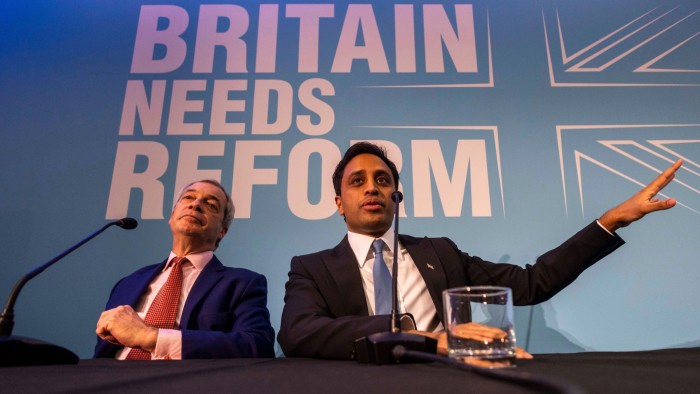Unlock the Editor’s Digest for free
Roula Khalaf, Editor of the FT, selects her favourite stories in this weekly newsletter.
Two former employees of Nigel Farage’s right-wing populist Reform UK party have filed legal complaints against the organisation in a row over money they say the party owes them.
The cases were filed this month in small claims court in Northampton by the former employees, who claim they were summarily dismissed last year after the UK general election without payment for several months of work.
One claimed she was hired on a temporary contract as a campaigner in the run-up to the July election, when Reform won five seats in parliament, and was fired in September without being paid £8,000 she was owed for three months of work, according to documents seen by the Financial Times.
The second claimed he worked for the party as a manager for nearly three years before being sacked in November without notice or nearly £9,600 in back pay for the four months before he was let go.
Reform said the employees had “attempted to bring legal claims against the party based on what we have reason to believe are fraudulent and forged ‘employment contracts”. The claimants denied the allegation as “wholly unsubstantiated”.
After the election, Farage overhauled the management of Reform, bringing in a new chair, tech entrepreneur Zia Yusuf, and removing former deputy leader Ben Habib and former chief executive Paul Oakden.
Reform said the new management team had launched an investigation into how the party had previously been run. “Several employees under the old management had their employment terminated [by the new leadership],” it said.
Habib said “It is not acceptable the way that the new management treat the grassroots of Reform.
“They’re long on criticism and short on recognition of those who delivered the party into the position it’s in today,” he added.
Oakden did not reply to a request for comment.
The row underscores the challenges faced by Farage as he seeks to draw a line with his time as the leader of more amateur political outfits including the Brexit party and the UK Independence Party.
Reform UK has soared in the British opinion polls in recent months, and is now the most popular party with around 26 per cent of public support, according to Politico’s poll of polls, with Labour on 25 per cent and the Tories on 21 per cent. The local elections in May will test whether that polling will translate into electoral success.
Reform is currently constituted as a company, unlike other UK political parties, which are associations, but Farage has pledged to hand ownership of the party over to members and divest his stake of more than 75 per cent.
Reform’s membership recently surpassed 200,000, according to its website, compared with 131,680 declared by the Conservatives in November last year and some 370,000 for the Labour party.




